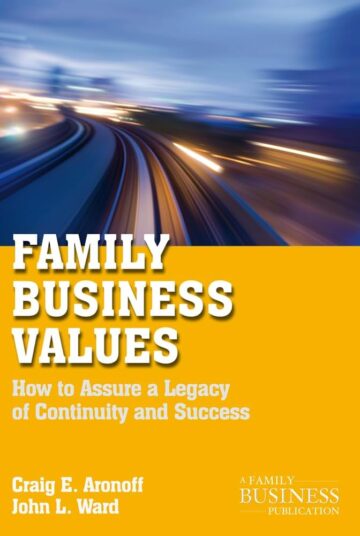Family Business Values: How to Assure a Legacy of Continuity and Success
English
İş Dünyası
En başarılı aileler, duygusal bağlara ve paylaşılan tarihe derinlemesine kök salmış güçlü değerlere sahiptir. Bu değerler, insanlara nasıl davrandığımızdan iş dünyasında alınan güçlü stratejik kararlara kadar her gün alınan kararlar için önemli dayanaklara sahiptir. Bu kitap okuyuculara temel değerlerden nasıl yararlanabileceklerini ve bunları stratejik avantaj için nasıl kullanabileceklerini göstermektedir. (Tanıtımdan-İngilizceden Çevrilmiştir)
Yazar
: Craig E. Aronoff, John L. WardYayınevi
: Palgrave Macmillan
ÖZET
- Values are the cornerstone of human achievement and commitment.
- Values inspire people to do things that are difficult, to make commitments that require discipline, and to stick to plans for the long houl.
- Values are the bedrock of culture in business and in families alike.
- Financial success of any company ultimately rests upon its culture and the underlying values.
- Shared values enable family members to derive pleasure and meaning from sustaining cross-generational relationships and striving toward mutual goals.
- “Nordstrom’s supreme advantage over its that it has been and will continue to be controlled end operated by the Nordstrom family. Family control brings an institutional memory, a consistent message, and stability for long-renge planning.”
- Values tend to endure over time.
When shared among owners, decision makers, and employees in a business, they have great power in shaping the business’s performance and results.
- Corporate culture is the buildup of beliefs and values that drive the business, and the day to day assumptions and behaviors that reflect those values.
- Values also shape a business’s response to crisis.
- Values are powerful motivators of people.
Bottom-line objectives typically fall short in building a vision for the future.
- Organizations that achieve lasting competitive advantage typically find some higher motivation that enables participants to feel pride in the organization and to believe in that they’re doing.
- As values come to life in a business culture, they take on a self-renewing energy.
People who are drawn to work in a business typically share its values; so do people who are promoted to leafership positions.
That is a powerful source of efficiency.
If a business has the right values for success, it tends to employ and attract people eho will achieve it.
- Chick-fil-A, owned by Atlanta’s Cathy family, closes its operations every Sunday, including more than 1,500 fast-food restaurant outlets. That reduces costly attrition; “We have one of the lowest rates of turnover in the industry”.
- Values can give business leaders and owners the courage to take steps in new, ambiguous directions.
- When a company’s identity can’t be separated from a few key products – any of which may become obsolete – or from the identity of its leader, it can’t be known for what it stands for. Nor can it endure in any meaningful form.
- When strategy is a good fit with owners’, managers’, and employees’ values, it is likely to be implemented with greater energy, enthusiasm, and insight.
Bringing values to life imparts passion and motivates people to go the extra mile.
- A strength of many family businesses is the value owners place on trust, integrity, and loyalty. The face of the family business is the family’s face; its name is the family name. Family firms’ long-term orientation makes them more likely to behave in ways that build commitment.
The reputation of owners and their heirs rests on the integrity of the business and its trust-worthiness with key stakeholders.
These qualities make family businesses attractive venture partners, giving them a critical advantage in the global economy.
- Family businesses that value trust tend to attract partners worthy of trust.
Well-placed trust reduces the cost of doing business, eliminating the need for a lot of back-checking, lawyering, and guarding one’s flanks.
- Values shape feelings, thoughts, and behavior in different ways at different levels of human activity.
- Values, in turn, shape norms, the shared assumptions or guidelines about what constitutes right action or conduct.
- Values in family business, also hold the key to resolving some challengers innate to family business ownership.
- Family and business are so fundamentally different that they naturally pull apart over time.
- Family and business have different short-term goals.
Business needs to operate as a meritocrarcy.
The family may need high dividends to thrive, while the business needs capital reinvested.
The family may want all members included in the business, while the business needs to exclude unqualified employees.
The business may need to fire a family member, a prospect that horrifies the family.
The business may nees to take on dept to grow, clashing with the family’s desire for security and stability.
The business may need a single CEO, while the family wants siblings or cousins to share power equally.

- Business families that find common ground in shared values often gain an inspiring and uplifting perspective.
Identifying shared interests, finding the common good, is a powerful process.
- A strong valuesystem tends to improve business planning and decisions making, to attract a stronger workforce, and to strengthen the hand of business leaders in the marketplace.
Family members are encouraged to undertake the work of further strengthening the family and assuring a shared legacy.
The best interests of the business serve the family, and the best interests of the family serve the business.

- Shared values among owners can strengthen a business, differences in values can cripple it.
Without shared values, family members “feel disconnected from others in the company”.
- Any traditional family business has a greater chance of long-term survival when there is a vision greater than the business itself.
- The family business investment could be a vehicle not only for long-term financial gain, but for nostalgia and for teaching children certain values.
- We see “value” as a neutral term.
It is neither automatically positive nor automatically negative.
- Even when they remain unspoken or uncoscscious, values based on prejudice or other counter-productive beliefs have great power to disrupt family business relationships and results.
- True values arise from people’s real experience, history, and traditions.
They can’t be invented.
- Values must be authentic, must be piercingly simple, they must be resilient.
- In family business, values also must be durable, resilient in changing times.
The best values are robust, distinct, and powerful.
They encompass as many dimensions of business and family behaviors as possible.
Values Found in Successful Family Businesses
-
-
- Accountability:
The family that values accountability is more likely to produce business leaders willing to reach out for resources that enhance their chances of success.
- Accountability:
-
-
-
- Adding value:
To succeed, a business must consistently add value. Adding value also gives individuals, both in the business and in the family, a sense of making a difference, of making a contribution.
- Adding value:
-
-
-
- Collective good:
When situations pit the needs of one individual against what’s best for everybody, the collective welfare will prevail.
Such balancing acts are nearly universal in family business.
Sibling rivalries, succession problems, family jealousies over compensation, arguments about dividends vs. reinvestment in the business – all are rooted in the tension over valuing the whole over the sum of the parts.
- Collective good:
-
-
-
- Valuing input and interaction (give and take):
Families who value input and interaction learn to ease difficult family decisions. The mere process of sharing a decision empowers children, makes them believe their ideas are important, and lays the groundwork for countinuing success.
- Valuing input and interaction (give and take):
-
-
-
- Education and development:
Families who devote time to teaching communication and interpersonal skills are more likely to produce capable successors, both as leaders and owners. Cultivating a sense of responsibilty around ownership and family membership builds cohesiveness in the family and strength in the business.
Business leaders who invest in employee training and development are more likely to build a strong, winning culture and to attact and retain great people.
- Education and development:
-
-
-
- Ethical conduct:
A history of ethical conduct makes the business more attractive to outside investors or partners.
A reputation for ethical conduct can actually attract new business opportunities in the form of partners looking for joint ventures or strategic alliances.
- Ethical conduct:
-
-
-
- Focus on values and values education:
Identifying, naming, and plannig to exercise shared values in the world at large can be the most bonding of family activities.
- Focus on values and values education:
-
-
-
- Fun:
Many families place a high priority on having fun together.
They may cultivate curiosity, creativity, or non-conformity as explicit principles.
- Fun:
-
-
-
- Justice:
A focus on justice or fair process can ease decision making at all levels of the family business.
People can accept a decision they oppose, if they believe the process of decision making was fair.
- Justice:
-
-
-
- Meritocracy:
Valuing merit as a basis for business decisions also can become a way of thinking.
If children are raised on this principle, they will have more realistic expectations about their future and a beter understanding of meritocracy as a business strength.
This makes the business attractive to the most capable family members.
- Meritocracy:
-
-
-
- Openness:
Transparency is a value that builds strength over time in both the business and the family.
Sharing information in the business helps educate family members to commit the financial resources necessary for business success.
It aids strategic planning by giving trusted managers and directors the information they need to make wise decisions.
It encourages ethical behavior.
It aids estate planning by enabling co-owners of the business to coordinate ownership succession.
This principle helps build trust over the generations.
- Openness:
-
-
-
- Practical realism:
Practical realism is basic to business and family survival.
This principle means keeping your eye on the ball and being alert to the changing environment.
- Practical realism:
-
-
-
- Risk taking:
Families who understanding the need to take appropriate risks are far more likely to keep the business well-capitalized and to avoid arguments over draining cash as dividends or redeeming shares.
- Risk taking:
-
-
-
- Self-reliance:
A value that drivers many entrepreneurs and runs deep in many business families, it encourages hard work, initiative, and creativity, and fosters self-discipline of a kind that can heighten a family business’s chances of success.
- Self-reliance:
-
-
-
- Servant leadership:
Placing a higher value on helping others or helping the group achieve shared goals than on achieving your own individual desires is evidence of servant leadership.
Many business have not only multiple owners but multiple leaders as they pass to the next generation.
The degree to which a family business succeeds under multiple owners is often equal to the degree to which siblings or cousins embrace the principle of servant leadership.
- Servant leadership:
-
-
-
- Social purpose:
A family business that sees itself as working to improve society can reap several practical benefits.
The goodwill it earns can draw support from customers, employees, and lawmakers.
Fulfilling a social purpose also enables the owning family to take pride in the business and forge a stronger sense of identity.
As businesses pass into the third, fourth, and fifth, generations of family ownership, the value that commits family shareholders most strongly to ownership is the belief that the family business is in some way making a meaningful difference to society.
- Social purpose:
-
-
-
- Entrepreneurial spirit:
Many successful families in business together cultivate this spirit and treat the business as a continuing inspiration.
The business benefits from this value, too, in increased quickness to capitalize on new markets and opportunities.
- Entrepreneurial spirit:
-
-
-
- Stewardship:
Stewardship the most important value in families who are successful in passing businesses from one generation to the next.
To be a good steward as to take personal responsibility for leaving resources better than they were when came into your care.
The opposite of stewardship is proprietorship.
An owner who has a proprietary attitude believes, “This is my business, to do with whatever I wish. I invented the business. I suffered for the business. I built the business. If I want the business to serve my personal pleasure, I can have that. But if I don’t, that’s my decision, too.”
In proprietorship, the positive emphasis is on self.
In stewardship, the positive emphasis is on benefitting others in the future.
Business leaders who value stewardship are truly committed to the perpetual growth of the business.
They are motivated to continue to take risks, look for opportunities, and work extra hard, and they continually find meaning in doing so.
Families that believe in proprietorship risk creating a sense of entitlement in their children, because the perspective children see at work is a self-centered one.
Families who believe in stewardship have an opportunity to pass on a more generous, future-directed perspective.
- Stewardship:
-
-
-
- Trust:
Trust is a kind of valve that opens up family firms to the broadest possibilities for building a strong family and a strong business.
Families who can trust also are better equipped to think long term – one of the family business’s most important competitive advantages.
Members are confident that everyone’s interests will be taken into account over time.
Trust enables family members to benefit from the counsel of advisors and directors.
- Trust:
-
-
-
- Valuing stakeholders:
Tending the interests of all of a business’s stakeholders – employees, customers, shareholders, suppliers, and the community – can yield a family business advantage.
Family is first, but the family must act as if the business comes first.
Because running a successful business serves the goals and need of the family. Acting as if the business comes first requires the family to stick to a set of values that are healthy for family members as well.
- Valuing stakeholders:
-
- “Three cardinal virtues” of business as creativity, building community, practical realism. Creativity requires courage, hard work, and persistence.
Building community requires honesty and generosity.
Practical realism demands the capacity for self-understanding and self-correction.
- The stronger and more compelling the values they embrace, the higher the likelihood that some family members will disagree with them.
If a family’s values are extremely distinct, pronounced, or potentially controversial, they are likely to cause disagreement force some family members to exit the business.
- Successful families value the potential richness of individual differences, collaboration, and compromise.
- Families begin transmitting values very, very early, often before consciously realizing they are doing so.
Parents teach values mainly by living them.
This process begins almost at birth.
- Even the simplest youth activities can teach children lessons that reverberate in adult life. Coaching kid’s teams, leading scouting troops, or taking part in other volunteer endeavors can be an excellent way to teach valuing the collective interests of the group over individual self-interest, a value common to many successful business families.
- Wealth can deprive a child of opportunities to develop competency and chracter, offering “indulgent escapes from the need to experience hard work,” success, and failure. “Problems are created when families give enormous emphasis to the creation of wealth, but don’t give enough attention to the creation a sound family able to manage it.” “Money achieves values only through the use made of it. That wholly depends on the human qualities of those who create, perpetuate, and utilize it.”
- Children who are allowed to develop discipline in their lives and their work are better equipped to truly value any wealth or opportunities they may inherit, rather than using them as a route to self-indulgence or escape.
- Many families find that cherished old stories, told and retold at family gatherings, start family members talking about values.
- Families can use a variety of techniques for bringing shared values to life and passing them on:
-
- Writing family creeds
- Holding family meetings
- Telling stories
- Arranging fireside chats
- Conducting educational seminars
- Organizing an active board
- Setting up a “family universty”
- Introducing children to the business
- Writing an ethical will
- An ethical will is a letter or codicil to a legal will that bequeaths a spiritual or philosophical legacy.
It may be read before or after the author’s death or passed from generation to generation.
While no prescribed format is necessary, here are some possible subjects:
-
- The important lessons learned during your life,
- People and causes for which you feel a sense of responsibilty,
- Mistakes in your life you hope your children will avoid,
- Your definition of true success,
- Your hopes for loved ones’ future regarding family unity, ethical conduct, charity, or business relationships,
- Favorite sayings or stories,
- Expressions of gratitude, hope, or faith.
- Values in a family often come from the founder or another strong, charismatic figure – the hero or heroes of the business.
- Assuring a legacy of values becomes an ideal role for the founder as the next generation assumes leadership of the business.
- A leader who wants to be remembered for certain practices will freze the company culturally, paralyzing it in the face of change.
In contrasts, a leader can liberate the organization and his or her successors by imparting a value system that endures through the generations.
- Whether values are articulated or not, a successor who ignores a successful founder’s value system is making a mistake.
Identifying, articulating, writing down, and integrating values into the culture of the business can strengthen and unite management.
Also, when a team of siblings inherits the business, shared values can provide a rationale for succession and cooperation.
They become the basis for going forward together.
- As part of writing a family mission statement, the family may identify values that are relevant and helpful to the business.
- Once the family is clear on its mission, philosophy, and values, the next step is a statement of the nature of the family’s commitment to the business.
- Wall hangings, sculpture, the design of the business’s plants and buildins, or even parking-lot rules, can all reinforce values.
Displaying patents, service awards, or oil paintings of the founders on the wall may symbolize the value placed on creativity, servant leadership, or stewardship.
Embellishing bulletin boards with employees’ family photos or personal messages, rather than just mandatory goverment postings, may reflect value placed on openness and trust among stakeholders.
- Staying faithful to core values requires a conscious, planned effort in many bussinesses.
It means ensuring that day-to-day decision making and behavior reflect those values.
- Companies can give annual awards for employee behavior that best exemplifies their values.
- In a more formal exercise that might be called “a values audit”, family owners of one service concern meet annually with top managers and directors of the business to discuss how day-to-day operating decisions have reflected or failed to reflect the business’s stated values.
The usual talk about financial performance is excluded from this meeting.
- Too much change leads to rootless floundering.
Too little change leads to irrelevance and death at the hands of the competition. Changing what should remain constant leads to
Failing to change what must bend with the times leads to trouble.
- “Shared values” as the family umbrella widens, many families are hard-pressed to recognize, much less adhere to, shared values.
- What matters most?
The shared commitment to “a better life for the family”?
Or the founder’s commitment to doing personally whatever it takes to make the business succeed?
This evolution of values across generations can severely test families’ ability to find common ground.
- Conflicts over values demand a probing re-examination of the beliefs that underlie them.
Open, honest commutication, genuine effort, and an emphasis on the factors that unite the family and the business are essential.
- Many families find a solution through a change in emphasis rather than substance.
- Conflicting values also can weaken the ownership base of a family business.
A family business may value stewardship, for instance, a principle that stresses building the business for future generations.
Attaining cansistency in values is essential.
- Rather than waiting for cries or disagreements, many successful family business make planning for renewal a regular discipline.
Leaders of the family, the business, or both may meet each year to review a written statement of values.
If such planning is not done annually, it should definitely occur at key transitions such as successions, or whenever a fundamental question about the direction of the business is raised.
- Going public has a killing effect on a family business’s culture.
- A commitment to values and values education is the most important contribution a family can make to the success of both the family and the business.
- A culture based on strong, positive values benefits the family business in many ways.
It guides decision making in crisis, inspires top performance, and motivates employees by lending meaning to their work.
Values can fortify strategic planning by encouraging business leaders to challenge conventional thinking and adapt nimbly to change.
A strong culture can burnish the reputation of business partners and employees alike. Values also can strengthen shareholders’ commitment to long-term goals by providing a vision that transcends short-term financial goals.
- Values play a special role in uniting family and business.
When the goals of the family and the business diverge, as they invariably do at some point, shared values can lend a sense of mission and purpose that transcends those conflicts.
When values in the business and the strengthen people’s performance in both realms.
- Values must have certain qualities to work this way.
They must be authentic, simple, and durable – that is, resilient and malleable to changing times.
They should encompass as many dimensions of family and business behavior as possible.






